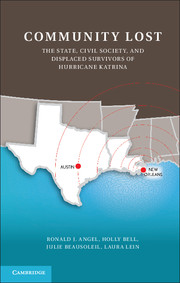Book contents
- Frontmatter
- Contents
- Acknowledgments
- Introduction
- 1 After the Storm
- 2 An Emerging Methodology for a Crisis Situation
- 3 Life before the Storm
- 4 Evacuation and Arrival in Austin
- 5 The Limited Transportability of Social Capital
- 6 Civil Society, NGOs, and the Grassroots Response
- 7 Housing, Employment, and Identification
- 8 Health Care and the Limitations of Civil Society
- 9 The State, Civil Society, and the Limitations of Social Capital
- Bibliography
- Index
7 - Housing, Employment, and Identification
Published online by Cambridge University Press: 05 June 2012
- Frontmatter
- Contents
- Acknowledgments
- Introduction
- 1 After the Storm
- 2 An Emerging Methodology for a Crisis Situation
- 3 Life before the Storm
- 4 Evacuation and Arrival in Austin
- 5 The Limited Transportability of Social Capital
- 6 Civil Society, NGOs, and the Grassroots Response
- 7 Housing, Employment, and Identification
- 8 Health Care and the Limitations of Civil Society
- 9 The State, Civil Society, and the Limitations of Social Capital
- Bibliography
- Index
Summary
In Chapter 5, we examined the role of the state in providing affordable housing and disaster services and traced the devolution of federal housing policy that has occurred over the past forty years. We also reviewed the history of the Federal Emergency Management Agency (FEMA). In addition, we discussed the differential impact of those programs and policies on two loosely defined groups of survivors: those who evacuated before the storm, most of whom had transferrable resources and social capital; and those who were forcibly evacuated after the storm. This much larger group was largely impoverished and brought limited social capital with them. We examined the very different barriers that these two groups faced in obtaining FEMA housing assistance in Austin. In that chapter, we also highlighted the importance of identification in obtaining assistance and the serious disadvantage that lost identification documents created.
In this chapter, we turn to the role of civil society in addressing survivors’ basic needs. We return to a discussion of housing policy and its impact on low-resource versus higher-resource survivors and to the critical role of identification in accessing services of all kinds. Housing, identification, and employment proved to be interconnected in survivors’ efforts to reestablish themselves in a new city. Low-income survivors encountered a number of structural barriers to recovery, and as we show, local civil society organizations were limited in their ability to deal with problems that had their roots in long-standing social disadvantage. We examine the role of social capital in terms of networks of mutual support that many low-income survivors relied on in New Orleans that were disrupted during the evacuation.
- Type
- Chapter
- Information
- Community LostThe State, Civil Society, and Displaced Survivors of Hurricane Katrina, pp. 150 - 171Publisher: Cambridge University PressPrint publication year: 2012



